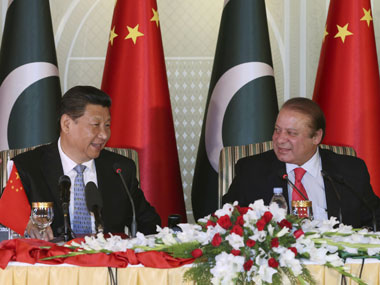As Home Minister Rajnath Singh’s speech at Saarc conference in Islamabad became a talking point on Wednesday, a different geopolitical narrative was unfolding in China’s Xinjiang province.
Afghanistan’s Chief of General Staff General Qadam Shah Shahim, China’s Chief of Joint Staff General Fang Fenghui, Tajikistan’s Chief of General Staff Major General Emomali Sobirzoda and Pakistan’s Chief of Army Staff General Raheel Sharif met in Urumqi, Xinjiang to formally unveil their counter-terrorism alliance — Quadrilateral Cooperation and Coordination Mechanism in Counter Terrorism (QCCM).
All parties agreed that terrorism and extremism posed serious threat to the region and pledged to share intelligence, enhance counter-terrorism capabilities, and conduct joint training and counter-terrorism exercises for its armed forces.
“China will spare no efforts to deepen regional counter-terrorism cooperation, maintain regional security and stability, and promote common prosperity and development of the four countries,” declared General Fenghui, according to a statement released by the state-run China Military Online.
Symbolism and the Central Asian battlefield
China’s choice of Urumqi in Xinjiang to kickstart a regional counter-terrorism initiative is hardly a coincidence. Islamic extremism in Xinjiang Uyghur Autonomous Region — the 2014 Urumqi attack being the most recent one among others — has been a major concern for China. The East Turkestan Independence Movement (ETIM) group, allied to Al-Qaeda and Taliban, has claimed numerous terror attacks in Xinjiang. Thus, the launch of a regional counter-terrorism alliance in Urumqi was an overt declaration of Beijing’s commitment to safeguard its tumultuous north western province.
 For quite a long time, Beijing has managed to ruthlessly suppress the Islamic insurgency in its restive Uyghur dominated Xinjiang province with the help of its Central Asian client states. China’s ever-deepening economic and military cooperation with the Central Asian nations, especially Tajikistan, is rooted in its fears that political instability and Islamic extremism in the region would spill over in Xinjiang.
For quite a long time, Beijing has managed to ruthlessly suppress the Islamic insurgency in its restive Uyghur dominated Xinjiang province with the help of its Central Asian client states. China’s ever-deepening economic and military cooperation with the Central Asian nations, especially Tajikistan, is rooted in its fears that political instability and Islamic extremism in the region would spill over in Xinjiang.
Source From : firstpost.com



